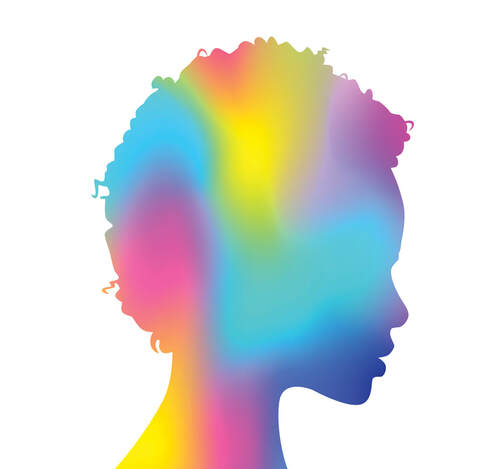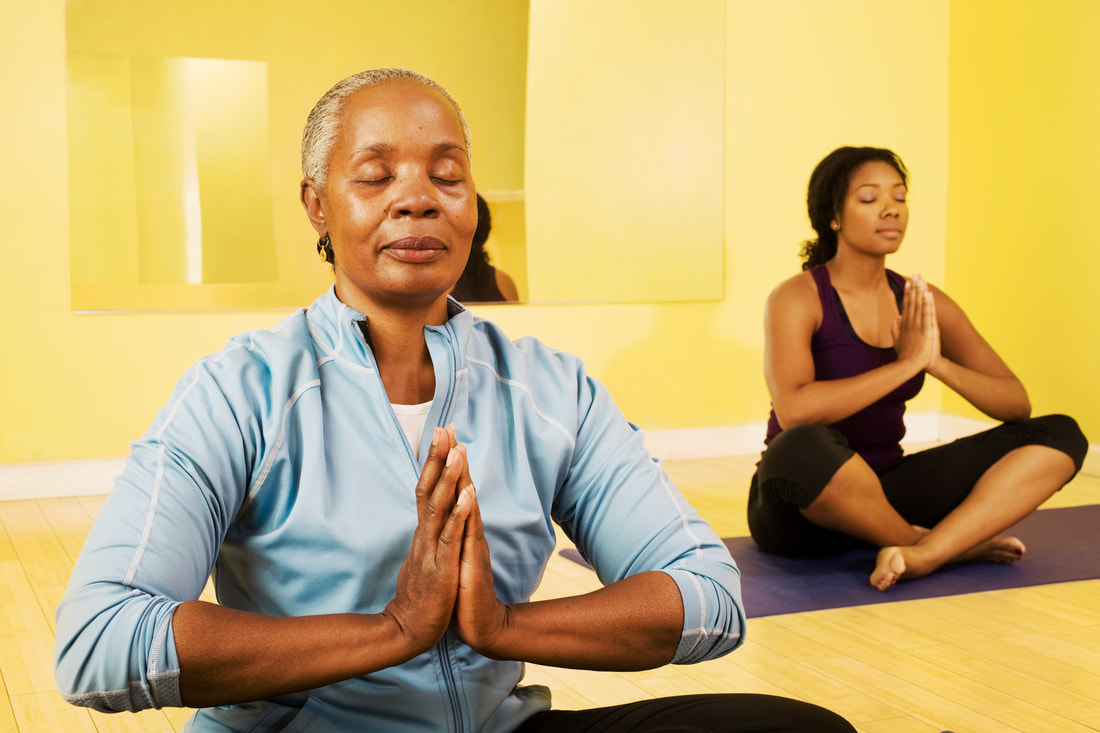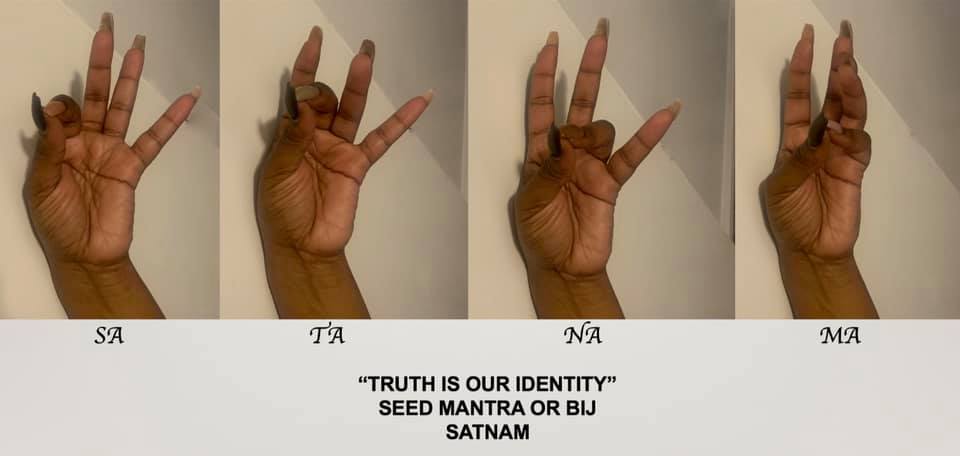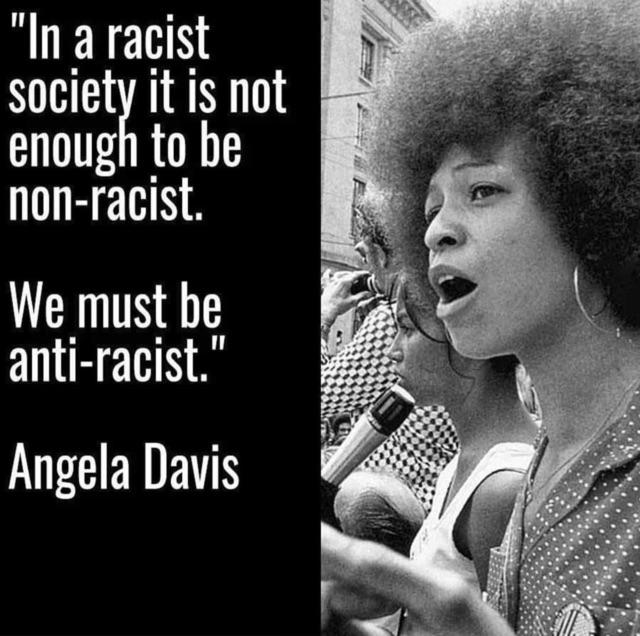People of Color Yoga for Resilience and Well-being

Join My Meetup to find the Most Updated Schedule and Passwords for POC Classes being offered by myself (Nya Patrinos) and others.
Currently I am teaching on Zoom. Please sign up through my Meetup to protect our safe space:
People of Color Yoga for Resilience and Well-Being
by Nya Patrinos
(first printed in Yoga Therapy Today in the Spring 2019 issue)
As an African-American woman I have encountered racism throughout my entire life. At various times these experiences of racism have left me angry, scared, disoriented, hopeless, and/or depressed. Whenever I feel imbalanced, I ask myself: How can I use my yoga tools for healing and transformation? People of Color (POC) Yoga has developed out of my personal quest to find yogic solutions to the stress and trauma of being a person of color in America.
My inspiration to teach POC Yoga developed from my participation in a half day intensive for people of color in mindfulness meditation led by Larry Yang. Through this experience, I recognized the healing power of being in a POC specialty group. I left the workshop feeling rejuvenated and optimistic and knew I had to somehow continue this work.
Many of us at the workshop were so inspired that we decided to form a bi-monthly POC sitting group. Because of my passion to make a difference in my life and the lives of others, I started teaching POC Yoga as gentle stretching between periods of meditation at the POC sit. Eventually, the class became its own offering.
Many of us at the workshop were so inspired that we decided to form a bi-monthly POC sitting group. Because of my passion to make a difference in my life and the lives of others, I started teaching POC Yoga as gentle stretching between periods of meditation at the POC sit. Eventually, the class became its own offering.
I have held POC Yoga at a meditation center, college rec room, various yoga studios, the park, and on the beach. The venue has changed many times depending on what was available. Sometimes I have rented the space. Sometimes the space was donated. But my intention to continue with the class has remained steadfast, and the feedback has been wonderful.
We people of color need yoga. We experience higher risks for physical health issues (cardiovascular disease, diabetes), behavioral health issues (substance abuse, cigarette smoking), and mental health issues (depression, post-traumatic stress disorder). Numerous studies cite racial discrimination as a major predictor of illness. Communities of color can be very different ethnically and culturally, but what we share is a history of prejudice, violence, racism, colonization, and/or genocide. I believe these experiences of historical, race-based, vicarious, and transgenerational trauma can be addressed in a trauma-sensitive yoga program for self-identified people of color where they can feel acknowledged, validated, safe, and supported.
“Self-identified” is my key concept. In the early days of the POC sitting group there were differing opinions as to who should be allowed to participate. I made a few mistakes myself by questioning someone’s race. Then I took on the model of self-identified. If someone was in the class, everyone was to assume they should be. No questions were ever to be asked.
I strive to create a safe container where people of color don’t have to worry about being hypervigilant, perfect, threatened, shamed, or exoticized. The space must feel safe for healing to occur. Participants are welcome to stop, alter, or modify any yoga poses, and even leave if they wish. I teach with a sense of welcome and gratitude. I realize people are sharing their most precious commodity— their time. In addition, they are trusting me and themselves with their bodies. POC Yoga is taught with empathy, genuineness, unconditional positive regard, and “wisdom-enhancing” techniques from all traditions.
Although the focus is people of color, I hope that the program is equally useful as a model for trauma-informed group yoga and other ally-ship groups. POC Yoga offers an integrative therapeutic model to address collective trauma by applying yoga therapy techniques to increase resilience and well-being.
Currently I am teaching on Zoom. Please sign up through my Meetup to protect our safe space:
People of Color Yoga for Resilience and Well-Being
by Nya Patrinos
(first printed in Yoga Therapy Today in the Spring 2019 issue)
As an African-American woman I have encountered racism throughout my entire life. At various times these experiences of racism have left me angry, scared, disoriented, hopeless, and/or depressed. Whenever I feel imbalanced, I ask myself: How can I use my yoga tools for healing and transformation? People of Color (POC) Yoga has developed out of my personal quest to find yogic solutions to the stress and trauma of being a person of color in America.
My inspiration to teach POC Yoga developed from my participation in a half day intensive for people of color in mindfulness meditation led by Larry Yang. Through this experience, I recognized the healing power of being in a POC specialty group. I left the workshop feeling rejuvenated and optimistic and knew I had to somehow continue this work.
Many of us at the workshop were so inspired that we decided to form a bi-monthly POC sitting group. Because of my passion to make a difference in my life and the lives of others, I started teaching POC Yoga as gentle stretching between periods of meditation at the POC sit. Eventually, the class became its own offering.
Many of us at the workshop were so inspired that we decided to form a bi-monthly POC sitting group. Because of my passion to make a difference in my life and the lives of others, I started teaching POC Yoga as gentle stretching between periods of meditation at the POC sit. Eventually, the class became its own offering.
I have held POC Yoga at a meditation center, college rec room, various yoga studios, the park, and on the beach. The venue has changed many times depending on what was available. Sometimes I have rented the space. Sometimes the space was donated. But my intention to continue with the class has remained steadfast, and the feedback has been wonderful.
We people of color need yoga. We experience higher risks for physical health issues (cardiovascular disease, diabetes), behavioral health issues (substance abuse, cigarette smoking), and mental health issues (depression, post-traumatic stress disorder). Numerous studies cite racial discrimination as a major predictor of illness. Communities of color can be very different ethnically and culturally, but what we share is a history of prejudice, violence, racism, colonization, and/or genocide. I believe these experiences of historical, race-based, vicarious, and transgenerational trauma can be addressed in a trauma-sensitive yoga program for self-identified people of color where they can feel acknowledged, validated, safe, and supported.
“Self-identified” is my key concept. In the early days of the POC sitting group there were differing opinions as to who should be allowed to participate. I made a few mistakes myself by questioning someone’s race. Then I took on the model of self-identified. If someone was in the class, everyone was to assume they should be. No questions were ever to be asked.
I strive to create a safe container where people of color don’t have to worry about being hypervigilant, perfect, threatened, shamed, or exoticized. The space must feel safe for healing to occur. Participants are welcome to stop, alter, or modify any yoga poses, and even leave if they wish. I teach with a sense of welcome and gratitude. I realize people are sharing their most precious commodity— their time. In addition, they are trusting me and themselves with their bodies. POC Yoga is taught with empathy, genuineness, unconditional positive regard, and “wisdom-enhancing” techniques from all traditions.
Although the focus is people of color, I hope that the program is equally useful as a model for trauma-informed group yoga and other ally-ship groups. POC Yoga offers an integrative therapeutic model to address collective trauma by applying yoga therapy techniques to increase resilience and well-being.
Older African-Americans are about twice as likely to have Alzheimer's or other dementias as older whites

AFRICAN AMERICANS AND ALZHEIMER'S
The Alzheimer’s Association has identified an emerging public health crisis among us African-Americans.
• Alzheimer’s disease is more prevalent among African-Americans than among whites — with estimates ranging from 14% to over 100%
higher
• There is a greater familial risk of Alzheimer’s in African-Americans
• Genetic and environmental factors may work differently to cause Alzheimer’s disease in us African-Americans
• We African Americans experience higher rates of high blood pressure, high cholesterol, and diabetes, which places us at greater risk of developing dementia
Learn evidence based yoga and meditation practices for Alzheimer's Prevention and Brain Longevity.
Zee Cruise and Nya Patrinos are African-American Yoga Therapists certified in Brain Longevity by the Alzheimer's Research and Prevention Association.
Fridays at 5 pm EDT/ 2 pm PST
Let us know if another time would work better for you. We are available for presentations.
Kirtan Kriya is a meditation technique for Alzheimer's Prevention. Learn more about it here and in Zee and my (Nya's) Friday class.
It means "Truth is Our Identity."
Learn More About African-Americans and Alzheimer's
Maya Angelou Talks about Alzheimer's
USA Today Article: African-Americans face far greater risk than whites
African-American Alzheimer's and Wellness Association
How Race Effects Your Risk of Dementia
African-American Dementia Outreach Partnership (AADOP)
Us Against Alzheimer's
USA Today Article: African-Americans face far greater risk than whites
African-American Alzheimer's and Wellness Association
How Race Effects Your Risk of Dementia
African-American Dementia Outreach Partnership (AADOP)
Us Against Alzheimer's
It's time to practice YOGIC ACTIVISM!
Yoga and Inclusivity - A Plea to Studio Owners from a Black Yogini
by Nya Patrinos
1. Know that Race Matters and Racism Exists. Saying you don’t see color is not helpful and is another form of racism and white privilege. Get everyone who works in the studio trained in Anti-Racism and Decolonization so that the entire studio is culturally competent and aware of their racism, biases, and blind spots.
2. Offer scholarships and Donation Based Classes. If it’s decolonized anti-racist yoga there need to be enough classes on the schedule that someone can establish a practice no matter what their income level. That doesn’t mean everything on the schedule has to be free. I would suggest at the minimum 3 classes a week be donation based.
3. Open up studio space for POC/BIPOC-only classes (or teacher trainings). POC/BIPOC (Black, Indigenous, People of Color) need safe spaces where we can work on our own healing in community.
4. Make alliances with POC/BIPOC teachers, owned studios, businesses, and other complementary wellness spaces. Build relationships. Find out what they need. From those conversations see what you can do together.
5. Invite POC/BIPOC into positions of leadership. Let them speak for themselves and ask them what they want and need.
6. Get out of the studio and into the world. Hold classes in other places than the studio. Broaden your reach - enlarge who you are bringing yoga to. Consider Zoom, Youtube, Instagram Live, Facebook Live, parks, beaches, community centers, schools, fairs, and farmers' markets.
7. Hire more POC/BIPOC teachers. Many POC/BIPOC practitioners want to practice in a place where there are POC/BIPOC teachers and other POC/BIPOC practitioners. If you can’t find any - train some through the networks you are establishing.
8. Use I statements. Always speak from your own perspective and don't speak for others. Especially don’t speak for POC/BIPOC.
9. Your money counts. Buy your studio merchandise, software, etc. from POC/BIPOC owned and social justice conscious businesses. Research who your vendors are and if their policies don’t align with yours, replace them.
10. Teach the Yamas and Niyamas. Being an anti-racist means not tolerating racism. Let people know racism is not welcome in the studio. Take your talking points from the Yamas and Niyamas.
11. Do your own work. Be open to conversations about race and at the same time respect others’ boundaries. Don’t ask POC/BIPOC to explain racism to you. Undoing your white privilege is your own work.
12. When marketing chose images that reflect all colors and body types - when advertising classes - posting on social media - making flyers. Look at how the studio is representing itself. Are the images you use all white thin bodies?
13. Words matter. Offer your gender pronouns when starting a conversation and ask the other person how they would like to be addressed.
14. Place matters. Consider making an indigenous land declaration when referring to the location of the studio to show honor and respect to indigenous peoples.
15. Keep Educating yourself.
These are my opinions on how we can make the studio a safe place for all. I welcome your ideas and conversation.


